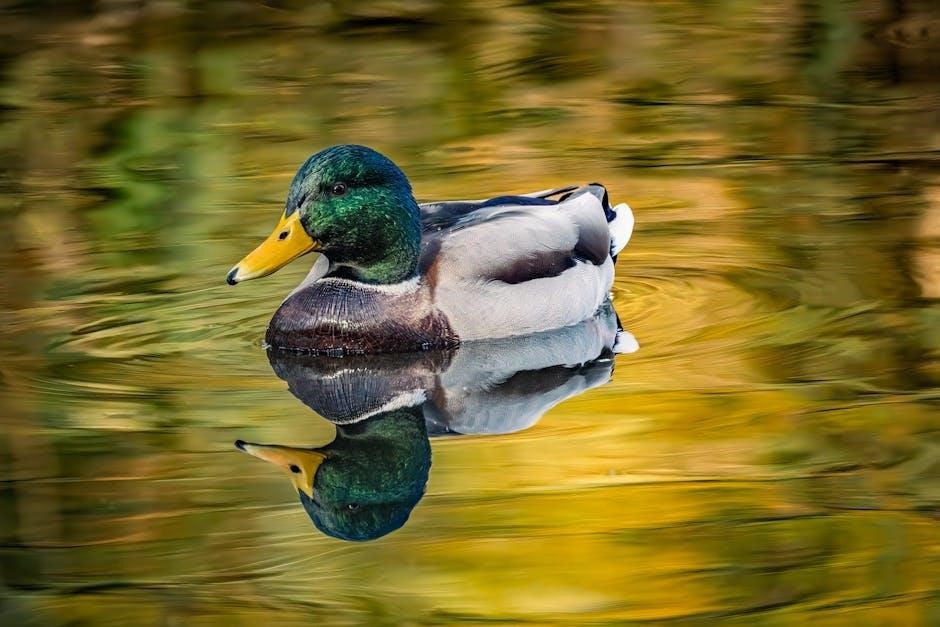Michigan duck hunting guides offer expert knowledge of local waterfowl habitats, ensuring successful and ethical hunting experiences. Their insights into species behavior and strategic locations enhance your hunt.
Overview of Michigan’s Duck Hunting Opportunities
Michigan is renowned for its abundant duck hunting opportunities, offering diverse waterfowl habitats across its vast wetlands, marshes, and Great Lakes shoreline. The state attracts numerous migratory species, including mallards, wood ducks, and black ducks. With its strategic location along major flyways, Michigan provides fertile ground for both novice and experienced hunters, making it a prime destination for waterfowl enthusiasts seeking memorable and rewarding experiences.
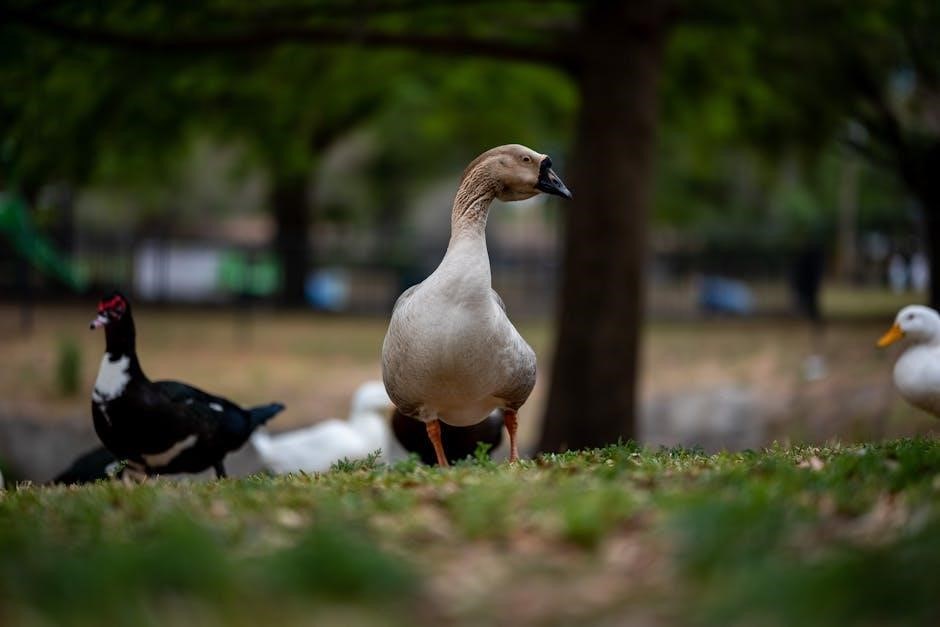
Season Dates and Regulations
Michigan’s duck hunting seasons vary by zone, with specific dates and bag limits set annually. Regulations ensure sustainable hunting practices and adherence to wildlife conservation goals.
Key Dates for Duck Hunting in Michigan
Michigan’s duck hunting seasons typically begin in early fall and late spring, aligning with peak waterfowl migration. Hunters must scout locations beforehand to identify active flyways and habitats. Specific dates vary by zone and are announced annually by wildlife agencies. Checking official sources for zone-specific start and end dates ensures compliance and a successful hunt.
Bag Limits and Species Restrictions
Michigan enforces strict bag limits to ensure sustainable waterfowl populations. Hunters can harvest a combined total of six ducks per day, with species-specific limits for wood ducks, mergansers, and others. Certain species, like harlequin ducks, are protected and cannot be hunted. Adhering to these regulations helps conserve wildlife and maintain healthy ecosystems for future generations.
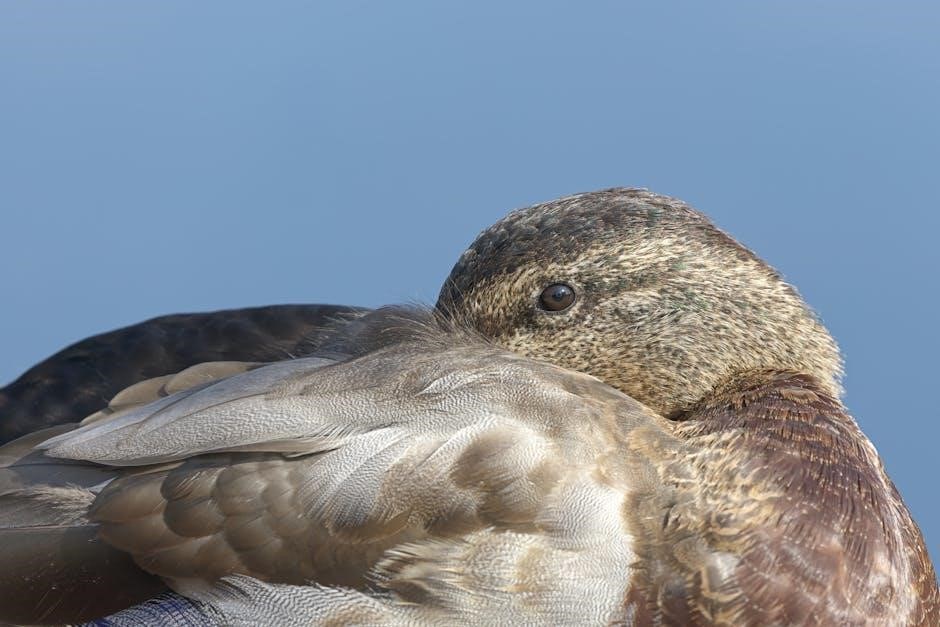
Licenses and Permits
Michigan requires a base license, waterfowl hunting license, and federal duck stamp for duck hunting. A Harvest Information Program (HIP) endorsement is also mandatory for compliance.
Required Licenses for Duck Hunting in Michigan
Duck hunters in Michigan must obtain a base license, a waterfowl hunting license, and a federal migratory bird hunting stamp. Additionally, a Harvest Information Program (HIP) endorsement is required, which is automatically included with the waterfowl license purchase. These licenses ensure compliance with state and federal regulations, supporting conservation efforts and sustainable hunting practices.
Federal Duck Stamp Requirements
A Federal Duck Stamp is mandatory for waterfowl hunting in Michigan. It costs around $25 and is available at license vendors or online. The stamp is valid for the entire hunting season and supports wetland conservation through the Pittman-Robertson Act. This requirement applies to all waterfowl hunters 16 years and older, ensuring contributions to habitat preservation and wildlife management efforts.
Harvest Information Program (HIP) Endorsement
The HIP endorsement is required for duck hunting in Michigan. It provides wildlife agencies with harvest data to manage waterfowl populations effectively. Hunters must answer a short survey about their waterfowl hunting plans when purchasing their license. This endorsement is included automatically with the purchase of a Michigan waterfowl hunting license, ensuring compliance and contributing to conservation efforts.
Popular Duck Hunting Locations in Michigan
Michigan offers diverse duck hunting opportunities across its wetlands and waterways. Key locations include Saginaw Bay, Lake Erie marshes, and Upper Peninsula wetlands, attracting various duck species.
Best Public Lands for Duck Hunting
Michigan’s public lands provide exceptional duck hunting opportunities. Saginaw Bay, with its vast wetlands, is a hotspot for waterfowl. Lake Erie’s marshes and the Upper Peninsula’s coastal areas attract diverse species. Public access sites like state game areas and wildlife refuges offer ample chances to hunt. These locations are well-managed, ensuring sustainable habitats for ducks and a rewarding experience for hunters.
Private Lands and Access Programs
Michigan offers private land access programs, enabling hunters to explore diverse habitats. The Hunting Access Program (HAP) allows access to private properties for waterfowl hunting. These lands often feature unique ecosystems and abundant species. Hunters can enroll in such programs through local DNR offices, ensuring ethical and regulated use of private lands for duck hunting adventures.
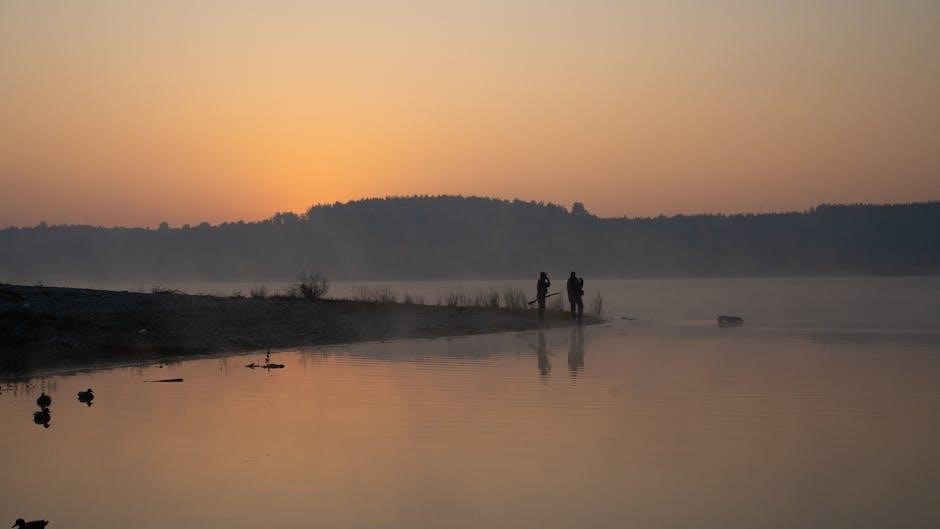
Best Practices for a Successful Duck Hunt
Understanding bird behavior, using quality decoys and calls, and maintaining camouflage are key strategies for a successful hunt in Michigan’s diverse waterfowl habitats.
Scouting Locations and Patterns
Scouting locations and patterns is crucial for a successful duck hunt. Understanding where ducks rest, feed, and migrate helps identify prime hunting spots. Observe waterfowl behavior during different times of day and weather conditions. Note water levels, vegetation, and food sources. This preparation allows for effective decoy placement and call strategies, enhancing your chances of a productive hunt in Michigan’s diverse habitats.
Effective Use of Decoys and Calls
Decoys and calls are essential tools for attracting ducks. Use realistic decoy spreads that mimic feeding or resting ducks, and position them based on wind direction and sunlight. Calls should imitate duck sounds naturally, with timing and volume adjusted to match the situation. Combine these strategies to create a believable setup, drawing ducks closer and increasing your chances of a successful hunt in Michigan’s waterfowl-rich environments.
Duck Identification Tips
Accurately identifying duck species requires observing plumage details, bill shapes, and flight patterns. Understanding habitat preferences aids in prediction and precise recognition, crucial for ethical hunting practices in Michigan.
Common Duck Species in Michigan
Michigan is home to a variety of duck species, including wood ducks, mallards, and green-winged teals. These waterfowl thrive in the state’s diverse wetlands and marshes, offering abundant opportunities for hunters. Understanding their habitats and behaviors is essential for a successful hunt, as different species respond to unique calling and decoy strategies. Conservation efforts, such as those by Ducks Unlimited, help preserve these populations for future generations of hunters.
Key Characteristics for Accurate Identification
Accurate duck identification requires observing key traits like plumage patterns, beak shape, size, and flight behavior. Wood ducks, for instance, display vibrant colors, while mergansers have distinctive serrated bills. Understanding these characteristics helps hunters distinguish between species, ensuring compliance with regulations and ethical hunting practices. Using field guides or online resources, such as those from Ducks Unlimited, can enhance identification skills and improve hunting success in Michigan.
Safety Guidelines for Duck Hunters
Always wear a life jacket and ensure firearms are unloaded when traveling by boat. Be aware of your surroundings and maintain a safe distance from other hunters.
Firearm Safety in the Field
Always treat firearms as loaded, keep the muzzle pointed away from people, and ensure the safety is on until ready to shoot. Use a plug to limit shells in your shotgun. Be aware of your surroundings, and never shoot without clearly identifying your target. Always follow Michigan’s firearm regulations and hunt responsibly to ensure a safe experience for everyone involved.
Water Safety and Boat Handling
Always wear a properly fitted life jacket while on the water. Ensure your boat is in good condition and equipped with essential safety gear. Be aware of weather conditions and avoid navigating in rough waters. Handle firearms and decoys carefully to prevent accidents. Respect other water users and follow Michigan’s boating laws to ensure a safe and enjoyable hunting experience.
Conservation Efforts in Michigan
Michigan prioritizes wetland preservation through organizations like Ducks Unlimited, restoring habitats and promoting sustainable waterfowl management. Conservation ensures thriving ecosystems for future generations of hunters and wildlife enthusiasts.
Habitat Preservation and Wetland Conservation
Maintaining Michigan’s wetlands is crucial for waterfowl habitats. Conservation efforts focus on restoring and protecting marshes, grasslands, and shorelines. Ducks Unlimited and local programs work to enhance these areas, ensuring sustainable breeding and migratory grounds for ducks. Public and private partnerships play a key role in preserving ecosystems, benefiting both wildlife and hunters while promoting biodiversity and environmental health.
Role of Hunters in Wildlife Management
Hunters play a vital role in Michigan’s wildlife management by contributing to conservation efforts and providing data on waterfowl populations. Through harvest surveys and ethical practices, hunters help maintain balanced ecosystems. Their support for organizations like Ducks Unlimited aids in habitat restoration, ensuring sustainable environments for ducks and other wildlife, while promoting responsible and ethical hunting traditions.
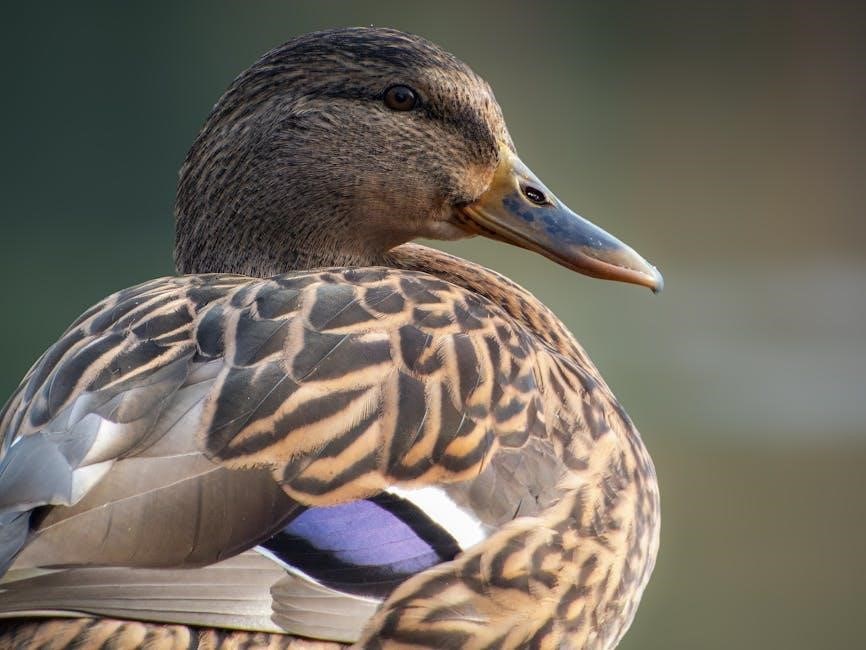
Choosing the Right Duck Hunting Guide
Selecting a reputable guide ensures a safe and successful hunt. Look for experienced guides with local knowledge of Michigan’s waterfowl habitats and ethical hunting practices.
What to Look for in a Guide Service
When selecting a guide service, prioritize experience and local knowledge of Michigan’s waterfowl habitats. Ensure they hold necessary permits and follow ethical hunting practices. Check reviews and ask for references to assess their reputation and success rates. A good guide will provide clear communication, safety protocols, and a well-organized hunting plan tailored to your needs.
Questions to Ask Before Booking
Ask about the guide’s experience with Michigan’s waterfowl, success rates, and familiarity with local habitats. Inquire about equipment provided, such as decoys and calls, and whether they accommodate your skill level. Ensure they follow safety protocols and conservation practices. Also, ask about their policy on bag limits, species targets, and how they handle varying weather conditions during hunts.
Necessary Gear and Equipment
Essential gear includes shotguns, steel shot ammunition, decoys, duck calls, waders, and blinds. Quality equipment ensures effective hunting and durability in Michigan’s diverse waterfowl environments.
Essential Gear for Duck Hunting
A shotgun (12- or 20-gauge), steel shot ammunition, and a reliable duck call are must-haves. Decoys, including species-specific models, attract waterfowl effectively. Camouflage clothing, waders, and a blind help hunters remain concealed. A paddle or push pole for navigating waterfowl areas and a dog for retrieving game are also valuable. Proper gear ensures both comfort and success during Michigan’s duck hunting seasons.
Recommended Firearms and Ammunition
A 12- or 20-gauge shotgun is ideal for duck hunting, offering balance and power. Steel shot ammunition is required for waterfowl hunting due to its non-toxic properties. Using shot sizes like BB or #2 for larger ducks and #4 or #6 for smaller species ensures effective harvesting. A modified or improved cylinder choke enhances pattern performance. Always ensure your firearm fits properly and adheres to Michigan’s hunting regulations for a safe and successful experience.
Hunting Ethics and Etiquette
Practice ethical hunting by respecting wildlife, other hunters, and the environment. Ensure fair chase, minimize waste, and follow all regulations to promote sustainable hunting and conservation efforts.
Principles of Fair Chase
Principles of fair chase in Michigan duck hunting focus on ethical practices, ensuring ducks have a fair opportunity. Guides promote sustainable methods, respect natural behaviors, and educate on conservation. They avoid excessive decoys or calls, fostering a balanced hunt. Adherence to regulations and minimizing environmental impact are key, preserving waterfowl populations and habitats for future generations.
Respecting Other Hunters and the Environment
Respecting other hunters and the environment is crucial in Michigan duck hunting. Guides emphasize maintaining safe distances, minimizing disturbances, and avoiding trespassing. Proper disposal of waste and decoys ensures habitat preservation. Hunters are encouraged to communicate courteously with others, share spaces responsibly, and adhere to conservation practices. This fosters a positive hunting community while protecting Michigan’s natural resources for future generations.
